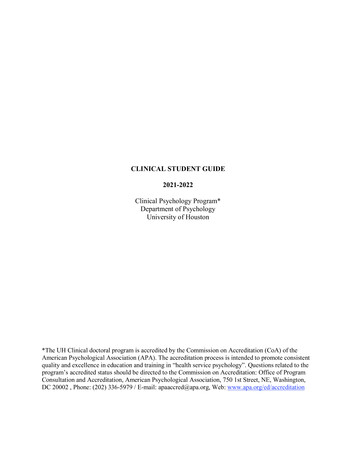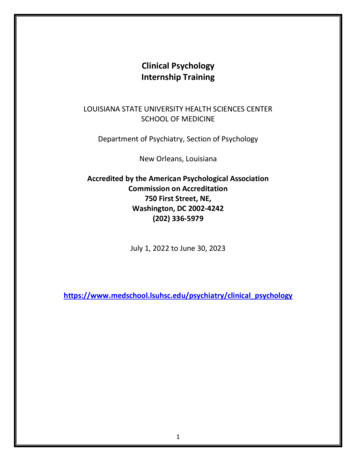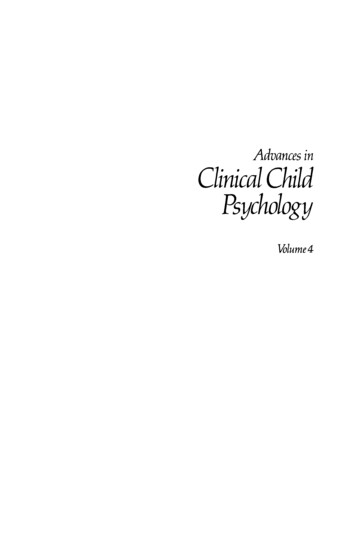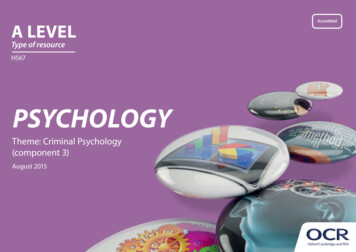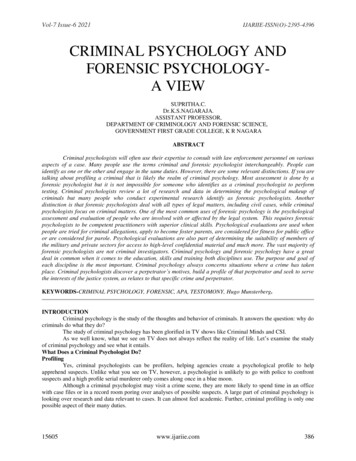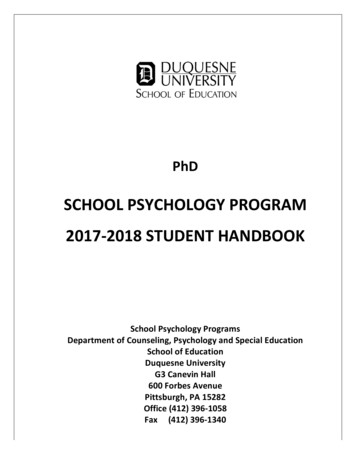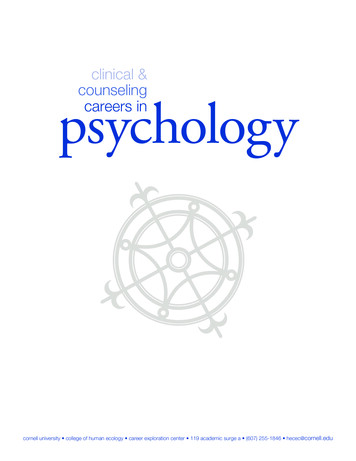
Transcription
clinical &counselingcareers inpsychologycornell university college of human ecology career exploration center 119 academic surge a (607) 255-1846 hecec@cornell.edu
human ecology career exploration center 119 academic surge aarts and sciences career services 55 goldwin smith hall
table of contentsAcknowledgements . 4Thinking of a Career in Psychology?. 5Which Graduate Degree Do I Choose?. 5Commonly Pursued Degrees. 5Typical Hourly Rates In Private Practice. 8Licensing. 8After I Choose a Degree, How Do I Choose a Program?. 9What Should I Major In?. 9What Courses Should I Take?.10How Difficult Is It To Gain Admission?.10Where Can I Go With Additional Questions?.11Admission Factors.12What Are Schools Looking For?.12GPA.12GRE Scores.12Coursework.13Letters of Recommendation.13Experience.14Application Essays.14Interview Performance.14Extracurricular Activities.15What Should I Do If I Don’t Get In The First Time?.15Recommended Courses.16Resources .183
acknowledgementsPrepared ByKris DeLucaDirector, Cornell CommitmentFormer Director, Human Ecology Career ServicesChristine Schelhas-MillerRetired Senior Lecturer and Assistant DUS, Human DevelopmentFormer Assistant Director, Arts & Sciences Career ServicesContributions FromJeff HaugaardFormer Associate Professor, Human DevelopmentMark LenzenwegerFormer Associate Professor, Human Development; Presentator,“Graduate Training in Clinical Psychology: Is it for You?”Kristi LockhartFormer Senior Lecturer, PsychologyCarol Maxwell MillerFormer Senior Lecturer, PsychologyRitch Savin-WilliamsProfessor, Human DevelopmentCornell University Human Development DepartmentCornell University Psychology DepartmentPanelists of “Clinical and Counseling Careers in Psychology:What Degree Do You Need?”: Ellen Johnson DeLara, M.S.W. Cristen Haltom, Ph.D., Experimental Psychopathology Jeff Haugaard, Ph.D., Clinical Psychology Eric Mendelson, Ph.D., Counseling Psychology Jill Tripp, Ph.D., Developmental PsychologyMental Health Association of Tompkins CountyWe are particularly grateful to Jeff Haugaard, Mark Lenzenweger, andKristi Lockhart for their comments on the first draft of this booklet. Wewould also like to thank Margaret Lavery, HD’04, for revising the firstedition of the booklet.Questions about this booklet should be addressed to:Deanne Maxwell, 607-255-2532, e-mail: dhm8@cornell.edu andDiane Miller, 607-255-6924, e-mail: djm15@cornell.edu4
thinking of a career in psychology?Which Graduate DegreeDo I Choose?Several different graduate degrees may prepare you to pursue a clinicalor counseling career in psychology; you must determine which oneprovides the best match for your academic preparation, intellectualinterests, and career goals. A brief description of the most commonlypursued degrees follows. For additional information about differencesamong degrees and related topics, see the following books availablein the Human Ecology Career Exploration Center, 162 MVR or in theArts and Sciences Career Library, 55 Goldwin Smith Hall.* Getting In: A Step by Step Plan for Gaining Admission to GraduateSchool in Psychology. (2007). American Psychological Association.Washington, DC. (Can be purchased from APA, 800-374-2721, oronline at www.apa.org)* Graduate Study in Psychology, 2009. (2008). American PsychologicalAssociation (APA). Washington, DC. (Can be purchased from APA)The Insider’s Guide to Graduate Programs in Clinical and CounselingPsychology: 2008/2009 Edition. (2008). John C. Norcross, Michael A.Sayette, and Tracy J. Mayne. New York: The Guilford Press.* denotes highly recommendedCommonly PursuedDegreesPh.D. in Clinical Psychology A research based degree providing training to be a scientist,scholar, and practitioner. A versatile degree: it allows you to workin mental health settings and hospitals, private practice, research,teaching, and consulting. Clinical psychologists with a Ph.D.can work in health care settings with patients with more severedisorders. They can teach in psychology departments and theirresearch is experimental psychological research. Very competitive admissions standards. For all Ph.D. programs, it’s common for applicants to apply towork specifically with a faculty mentor rather than to a program. Ifa mentor is not taking on students that year, it doesn’t matter howqualified an applicant is: if the mentor is not accepting students,the applicant will not be accepted to the program. Many facultypost whether or not they are accepting students on their webpages; applicants may also send a brief inquiry to the facultymentor as well. Programs are typically in university psychology departments,though some are in medical schools. Ph.D involves no loans and tuition waivers--many fund you withteaching or research assistantships.5
APA accredited programs lead to licensing. No APA accredited master’s degree in clinical psychology. Students usually need to complete a year or two as a full-timeresearch assistant before they apply. Time frame: 4 to 5 years of graduate school, 1 year APA-approvedclinical internship is mandatory for degree completion, andpossibly a postdoctoral position.Psy.D. in Clinical Psychology Provides training to be a practitioner, usually in private practice orcommunity mental health centers. Heavily based on course workand clinical experiential training; rather than research. Programs can be in professional schools or in universities. Typically admission is less competitive than clinical psychologyPh.D. programs. Some programs prefer applicants with morework and life experience. Programs (especially in professional schools) are funded throughloans and no tuition waivers are offered. Teaching or researchassistantships aren’t provided. APA accredited programs lead to licensing. No APA accredited master’s degree in clinical psychology. Students are often accepted directly from Cornell. Time frame: 4 years of graduate school, 1 year APA-approvedclinical internship is mandatory for degree completion. For someprograms, graduate school can be completed in 3 years, includingsummers, followed by 1 year of internship. Selecting appropriate Psy.D. program can be more difficult thanfor Ph.D. programs; be sure to consider internship success rates,as some Psy.D. programs have low rates of placing studentsinto APA-approved internships. Others have excellent internshipsuccess but it is worth looking at the internship rates in advance.Ph.D. in Counseling Psychology Provides training to be a practitioner, typically in private practiceor counseling centers, e.g. university counseling centers. It isalso possible to work in mental health centers or hospitals andconduct research. Allows you to teach in counselor educationand some psychology departments. Research methods usedby counseling psychologists generally include structured tests,interviews, interest inventories and observations. They deal morewith personal growth and adjustment problems, rather than6
psychopathology; extensive undergraduate work in psychologyis often not required. Usually in university psychology or counselor education. Admission is typically less competitive than clinical psychologyPh.D. programs. You can receive a master’s degree, and in some states, obtaina license to engage in a private practice with a master’s degree.New York State has recently added a process for individualswith master’s degrees to become licensed. Regulations vary bystate. Contact the state to get the latest information (see contactinformation under licensing below). Some individuals admittedalready have master’s degrees in psychology or counseling,others go directly into Ph.D. programs. Popularity of the Psy.D. in clinical psychology is growing, so fewerstudents are pursuing a Ph.D. in counseling psychology. Time frame: 4 years of graduate school, 1 year of internship.M.D. in Psychiatry Area of specialization studied after receiving a medical degree.Typically leads to a practice doing psychiatric diagnosis andtherapy. Can prescribe medication, but typically do not performpsychological tests (compared to Ph.D.s in clinical psychologywho typically perform tests, but cannot prescribe medication). Time frame: 4 years of medical school, 4 years of residency.Master’s Degree in School Psychology Provides training to become a psychologist in a school setting forthose interested in children, families and the schooling process.Allows you to perform testing, assessment, and counseling andprovide consultation to children, parents, and teachers. A Ph.D. inschool psychology provides the opportunity to teach in a schoolpsychology program, but is not necessarily an advantage as apractitioner in an elementary or secondary school setting. Programs are typically in school psychology or psychologydepartments, and admission is less competitive than Ph.D.programs in psychology. Salaries parallel teachers’ pay scales. Time frame: 2 years of course work and internships. Number andduration of internships vary depending on the program.7
Master’s Degree in Social Work (M.S.W.) Provides training to be a practitioner working in a mental healthclinic, hospital, nursing homes, human service agency, or privatepractice. Allows you to consult with businesses, but not toteach or perform psychological tests. A versatile degree that isincreasingly in demand given the trend toward managed healthcare in the US. A doctorate provides the opportunity to teach in asocial work program, but is not needed to work as a practitioner.Typical Hourly Rates InPrivate Practice Programs are typically in university social work departments. Less competitive admission than Ph.D. programs. Time frame: 2 years of course work which includes 450 hoursof field placement. Licensure examinations are required anddetermined by US and Canadian jurisdictions.Psychiatrist 110-160Ph.D. in Clinical or Counseling Psychology or Psy.D. 80-140M.S.W. 60-100* Note: Salaries can vary a great deal and the American PsychologicalAssociation does not track hourly rates as it may be considered“fixing the market.” For an annual salary predictor, visit Salary Wizardat www.salary.com and enter job title and geographic location.LicensingLicensing may have some bearing on your choice of a degree programdepending on the career option you hope to pursue. Each state hasits own licensing requirements. If you know in which state you want topractice, you may want to find out which programs automaticallyallow you to sit for the state licensing exam. For information on NewYork State requirements, call the Office of the Professions withinthe Department of Education at 518-474-3817 or visit them online athttp://www.op.nysed.gov/.When investigating programs you may want to ask questions abouthow easy it is for graduates to get licensed. In most states, APAapproved internships are required for licensure to practice therapy, sochecking internship placement rates of schools can be useful. If youhave questions about whether a specific degree will allow you to belicensed in a particular specialty area in New York State, the Office ofthe Professions web site also has helpful information.8
After I Choose aDegree, How Do IChoose a Program?You will want to attend a program accredited by the AmericanPsychological Association (APA). Graduate Study in Psychology,published by the APA, provides the most comprehensive informationabout different programs. It gives profiles of programs in the UnitedStates and Canada, including the theoretical orientation of thedepartment, characteristics of students, how it weighs admissionscriteria, the number of applications and acceptances, and financialassistance offered.After reading a school’s profile in Graduate Study in Psychology, youshould obtain and read the school’s catalogue or read their informationon their website. In addition, visiting the school and speaking to currentstudents and faculty members should provide you with informationon the following variables that you should consider when selectingprograms.1. Does the theoretical orientation of the school match yourtheoretical interests? For example, is it cognitive behavioral? Doesit emphasize a clinical science approach to treatment?2. Is the location and quality of life appealing?3. Do the current research interests of faculty match your own?4. What is the funding situation? Are tuition waivers and stipendsprovided?5. Does the program’s balance on the research/clinical dimensionmatch your interests?6. What is the quality of the research facilities and laboratories?7. What is the quality of the clinical facilities? Where do you seepatients? Where are the clinical supervisors?What Should I Major In?While many programs do not require an undergraduate psychologymajor, they require the completion of a number of psychologycourses. Majoring in psychology or human development is an easyway to complete the coursework that is required for admission. Checkspecific graduate programs for their requirements.9
What Courses Should ITake?Different programs will have different requirements; check thespecific requirements of programs that interest you. It is generallyrecommended that you take courses in these seven areas:1. Statistics2. Additional and higher level courses in Statistics such asExperimental Methods or Research Design3. Abnormal Psychology4. Personality5. Developmental Psychology or Child Development6. Cognitive Psychology7. Social PsychologySee the list of recommended courses in this booklet. Some programswill require courses in additional areas of psychology.How Difficult Is It ToGain Admission?10Admission to clinical psychology programs is highly competitive.Individual programs typically accept fewer than a dozen applicantseach year. According to a recent national study, 10% of applicantsto APA accredited clinical psychology programs were admitted. Theacceptance rate for Cornell students may be somewhat higher. Theattached description of admission factors provides more detailedinformation on selection criteria. Generally, Ph.D. programs incounseling psychology and Psy.D. programs have less competitiveadmissions standards. Admission to master’s degree programs insocial work and school psychology is also less competitive.
Where Can I Go WithAdditional Questions?The Human Ecology Career Exploration Center and the Arts &Sciences Career Library have a number of resources which provideextensive information on clinical psychology and related fields. Seethe list at the end of this booklet. Arts & Sciences students can seethe Arts & Sciences advisor in 55 Goldwin Smith Hall.Faculty with relevant background and interests in the Departmentsof Psychology and Human Development can provide information onthe reputation of programs, trends in the field, and the applicationprocess. Human Ecology students can see an advisor in the HumanEcology Office Career Development.You can arrange informational interviews with professionals in careerfields of interest to ask questions about the field and graduateeducation. Cornell’s Career Guide provides suggestions forconducting these informational interviews. You can also ask careerrelated questions of Cornell alumni through the CCNet mentors on theCornell Career Services website at www.career.cornell.edu. HumanEcology students may connect with Human Ecology alumni throughthe Cornell Alumni Mentor Program for Students (CAMPS) at:http://hecamps.chronus.com/p/main/about.You can also learn what it’s like to work in a particular field throughtwo job shadowing programs:FRESH ProgramFirst-year students can get an insider’s view of a career field byshadowing Cornell alumni in their workplaces during spring break.Extern ProgramSophomores, juniors and seniors may spend one day to one weekover winter or February break shadowing an alum in a career fieldof their choice. Opportunities are listed on career.cornell.edu inSeptember. Applications are due in October.11
admission factorsWhat Are SchoolsLooking For?It is difficult to state definitively the factors that will determine youradmission to a graduate program in clinical psychology. Eachprogram has its own admissions standards and requirements. Thesevariables make it difficult to define one set of standards that apply toall programs. In the case of Ph. D. programs in clinical or counselingpsychology, each faculty mentor may have specific admissionsstandards. However, almost all consider the factors cited below inlooking at potential entrants.Objective Criteria GPA (overall GPA, psychology GPA, and last-2-years GPA) Standardized test scores (GRE-V, GRE-Q, GRE-Analytical, andGRE-Psychology; MAT) Coursework (number of hours, subject area, and level)Nonobjective Criteria Letters of recommendation Experience Research experience Clinically-related public service Application essays Interview performance Extracurricular activitiesGPAThe average minimum GPA that most programs look for is 3.5.However, the way in which GPAs are rated varies from program toprogram. Some will have different required GPAs, others will lookmore closely at the last two years’ GPA, and others will also look atthe GPA you received in psychology courses. You need to consultindividual program descriptions in Graduate Study in Psychology todetermine the required and preferred minimums for each program.Program committees are also aware that a certain GPA is moredifficult to obtain at some schools than others.GRE ScoresAbout 90% of clinical psychology programs require you to take theGRE General and Psychology Subject tests. The average minimumscore required for serious consideration for clinical psychology is 600for any one component of the GRE general test. Consult individualprograms for their acceptance rates based on GRE scores. Thegeneral test should be taken at the end of your junior year or early inyour senior year.You should prepare to take the GRE Psychology Subject test bystudying a good introductory psychology textbook. The average12
minimum score required on the Subject test is 650. Take this test inthe fall of your senior year. A few programs use MAT scores as part ofthe admissions process. The average minimum MAT score requiredis 70. Many programs use test scores in conjunction with GPAs as aninitial screening criterion.CourseworkIndividual programs vary a great deal when it comes to undergraduatepsychology course requirements and preferences. Refer to GraduateStudy in Psychology for admissions requirements specific to individualprograms.While it is difficult to generalize, many graduate psychology programsare more interested in generalists than specialists; graduate programsare considered the appropriate place to specialize. Therefore, abroad undergraduate education is often considered to be the bestpossible preparation. This means, in addition to psychology, yourcoursework should cover a range of disciplines including physical andbiological sciences, math, English literature and composition, history,philosophy, sociology and anthropology, and a foreign language.Laboratory based natural or biological science courses taken fromdepartments other than psychology can nicely complement yourtraining in psychological methods and theory.Programs tend to be biased toward math and science courses,because taking these courses conveys a certain willingness and abilityon your part to engage in scientific pursuits. Research experience ishighly regarded; therefore it is to your advantage to take lab basedclasses and courses with professors who are currently engaged inresearch with which you might be able to assist.A listing of suggested Cornell University courses is included on page11 in this booklet.Letters ofRecommendationYou will need to obtain an average of 3 letters of recommendationfor applying to most graduate programs. Letters of recommendationare often considered to be the most important nonobjective criterion.Ideally, recommendations should be from faculty who know youwell enough to provide specific information about your potential tosucceed in graduate school and in a career in clinical psychology.You can get to know faculty through independent studies, research,seminars and/or informal meetings. At least two of your letters shouldbe from faculty. The third could come from a supervisor of a clinicallyrelated public service activity, especially if he/she has a Ph.D. or M.D.13
ExperienceResearch ExperienceIn general, research experience is valued most highly by clinicalpsychology programs. The quality of the research experience ismuch more important than the content area. You should be intimatelyinvolved in the design and implementation of the research. In additionto psychology, research in fields such as biology, nutrition, or sociologycan be appropriate.Clinically-related Public ServiceOther psychology related work experiences, paid or volunteer, areviewed positively and can help you assess your suitability for a clinicalcareer. Clinically related public service includes the provision of mosthuman services related to mental health.Programs do make distinctions among specific kinds of experiencesand evaluate them differently, depending on the type of program andits particular orientation. Review Graduate Study in Psychology forspecific criteria for each program you are considering. If you mustdecide between types of psychology related work experiences, itis to your advantage to select research because of the high valueplaced on research by clinical psychology programs. Participatingin research is also a valuable method for investigating the field andperhaps developing a mentoring relationship with a faculty member.Application EssaysEssays are taken quite seriously in evaluating applications. They allowyou to elaborate on your unique qualifications and are evidence ofyour preparation for graduate study, thoughtfulness, writing ability,and appropriate creativity. The most typical themes targetedby these essays are your long-term career plans; your areas ofinterest in psychology; your research, practice-based, and teachingexperiences; and your reasons for choosing a particular program. Itmay be helpful to have your statement reviewed by your advisor oranother faculty member.Interview PerformanceMany programs request interviews. If you are asked to appear foran interview, chances are that you are among the pool of applicantsbeing seriously considered for admission. The interviewer will beinterested in assessing how well you seem to fit into the program.You should thoroughly acquaint yourself with the program’s trainingmodel, areas of concentration, and philosophy; have some familiaritywith faculty members and their areas of interest; and be able to showhow your interests and qualifications fit the program. The interviewis an opportunity for them to assess your personal characteristics.Individual faculty may be viewing a candidate with an eye to whetheryou might be interested in working in his/her area of research. Travelto and from interviews is often paid for by the applicant.14
ExtracurricularActivitiesThese are not as critical as they were when applying to an undergraduateprogram. Membership in psychology related organizations can behelpful. For a list of organizations, refer to the resources section ofGetting In: A Step by Step Plan for Gaining Admission to GraduateSchool in Psychology.What Should I Do If IDon’t Get In The FirstTime?Admission to clinical psychology programs is extremely competitive.It is important for you to have a back-up plan if you are deniedadmission the first time. You have several alternatives: Apply to other programs for the same school year Reapply to the same programs or apply to other graduatepsychology programs after gaining additional experiences Consider alternatives to a graduate degree in psychologyFirst assess your credentials against the admissions requirementsof the specific program where you were denied admission anddetermine whether you set your sights too high. If your credentialswere very good, the competition for this year or the programs youchose may have been exceptionally intense.You can examine programs that have late application dates and applyafter you’ve been denied at your original schools. The APA EducationDirectorate compiles a list of programs that have openings after April15 available May 15. Contact the APA at 800-374-2721 to receive thelist or view it at www.apa.org/ed.If you decide to wait and reapply, you should first determine whetheryou should reapply to programs where you were chosen as analternate but didn’t get in, or to programs where you were denied.Programs where you were chosen as an alternate are good betsbecause they expressed interest in your qualifications. For schoolsthat firmly rejected you, contact them to see if they’d consider anotherapplication from you. Try to determine how to strengthen yourcandidacy and demonstrate additional qualifications that you mayhave acquired.Prior to reapplication be sure to evaluate your credentials againstprogram admission requirements and also be certain that you’reselecting schools that match your qualifications. The period betweenapplications should be used to improve your qualifications to increaseyour chances for acceptance. Consider taking or retaking courses,retaking tests, or obtaining solid research or clinical experience.* adapted from Getting In: A Step by Step Plan for Gaining Admissionto Graduate School in Psychology (2007) American PsychologicalAssociation.15
recommended coursesCoursesIt is important to develop a solid foundation in basic psychologyand supplement that with additional coursework in a specific topic/subject depending on interest. It is recommended that you completecoursework in each of seven areas: statistics, experimental methods,biological bases of behavior, personality, psychopathology, socialgroups, and cultural influences on development. Cornell Universitycourses recommended for application to clinical psychology programsare listed below. To assist you in building the recommended level ofknowledge, where possible, we’ve delineated which courses couldserve as the basic foundation in a particular area and which courseswould provide additional study.It should be noted that the list below provides courses from whichstudents can select. It is not necessary to complete them all, as longas you have selected courses from each of the seven primary areas.However, because many graduate programs have specific courserequirements, be sure to consult the particular program requirementslisted in Graduate Study in Psychology.Basic StatisticsAEM 2100 Introductory StatisticBTRY 3010 Biological Statistics IILRST 2100 Introductory StatisticsILRST 2120 Statistical ReasoningMATH 1710 Statistical Theory & Application in the Real WorldPAM 2100 Introduction to StatisticsPSYCH 3500 Statistics and Research DesignSOC 3010 Evaluating Statistical EvidenceHD strongly recommends that students who plan to complete the HDHonors Program requirements take PSYCH 3500. The program alsorequires a second semester of advanced statistics, and HD 4750 or HD4760 is recommended. These recommendations are also applicableto students planning to pursue a Ph.D. in clinical psychology.Experimental MethodsHD 3820: Research Methods in Human DevelopmentPSYCH 4910: Research Methods in Psychology16
Biological Bases of BehaviorHD 2200: Biological Issues in Human DevelopmentHD 3200: Human Developmental NeuropsychologyHD 3660: Emotional Functions of the BrainPSYCH 3320/BIONB 3280: Biopsychology of Learning & MemoryHD 3440: Infant Behavior and DevelopmentHD/BSOC/NS 3470: Biological and Behavioral InteractionsPSYCH 3610/NS 3610: Biopsychology of Normal & Abnormal BehaviorHD 4660: Psychobiology of Temperament and PersonalityPSYCH 4220: Developmental BiopsychologyPSYCH 4250: Cognitive NeuroscienceHD 4330: Developmental Cognitive NeuroscienceHD 4780: Attention Deficit/Hyperactivity Disorder in ChildrenPersonalityHD 2600/PSYCH 2750: Introduction to PersonalityHD 3490: Positive PsychologyHD 4660: Psychobiology of Temperament & PersonalityPSYCH 4890: Beliefs, Attitudes & IdeologiesPsychopathologyHD 3300: Developmental PsychopathologyHD 3530: Risk & Opportunity Factors in Childhood & AdolescenceHD/PSYCH 3270/3280: Field Practicum I & IIHD 3700/PSYCH 3250: Adult PsychopathologyHD 4680: Stress in Childhood & AdolescenceHD 4770: Psychopathology in Great Works of LiteratureSocial GroupsPSYCH 2800: Introduction to Social PsychologyPSYCH 48
The Insider's Guide to Graduate Programs in Clinical and Counseling Psychology: 2008/2009 Edition. (2008). John C. Norcross, Michael A. Sayette, and Tracy J. Mayne. New York: The Guilford Press. * denotes highly recommended Ph.D. in Clinical Psychology A research based degree providing training to be a scientist, scholar, and practitioner.
